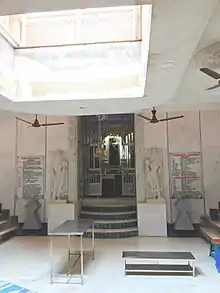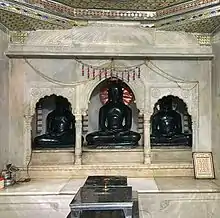Bhonyra
In Jainism, a Bhonyra (Prakrit languages: भोंयरा Bhōnyarā, Sanskrit: भूमिगृह Bhūmigr̥ha) is an underground chamber with Jain images. In the past, it was used to conceal sacred idols during times of disturbance.[1]


| Part of a series on |
| Jainism |
|---|
 |
|
|
There are several Jain temples in Bundelkhand that existed as a concealed bhonyra chamber for several centuries before being rediscovered.
In 2001, an entire Jain temple was found beneath a mound known as Rajgadhi Timbo at Umta, Gujarat. It was apparently buried to protect it from the destruction about 800 years ago.[2]
In some regions, it became a common practice to build a bhonyra attached to the temple. Naya Mandir in Delhi has a concealed chamber. A visitor in 1876 described it:[3]
In Delhi I found a Jain temple which was wholly unknown to Europeans well acquainted with the city; and on prosecuting inquiry, I got its priest to open to me a concealed chamber containing large statues of several of the Tirthankaras richly ornamented.
The chamber has now been given the form of a cave, suitable for peaceful meditation by visiting Jain monks.
A few years ago, several Jain idols were rediscovered in a bhonyara in Sanghiji temple, Sanganer in Rajasthan.[4]
Some of the Jain temples in Ahmedabad have an underground chamber.[5]
References
- गोपाचल के निकटवर्ती तीर्थ क्षेत्र http://hindi.webdunia.com/religion/religion/jainism/0708/11/1070811065_2.htm
- Umta residents seek custody of Jain temple http://www.gujaratplus.com/00-01archive/arc393.html
- A RUN THROUGH KATHIAWAR—THE HOLY MOUNTAIN, Blackwood's Edinburgh Magazine Published by W. Blackwood, 1876, Item notes: v.120 1876 Jul-Dec
- Shri Digamber Jain Atishaya Kshetra Mandir, Sanghiji, Sanganer http://www.jainteerth.com/teerth/sanganer.asp Archived 19 July 2009 at the Wayback Machine
- PERFECT 10: JAIN TEMPLES, Ahmedabad Mirror, Jan 20, 2018 Many of the temples are believed to have been built in a manner where the idols were placed on the lower ground level